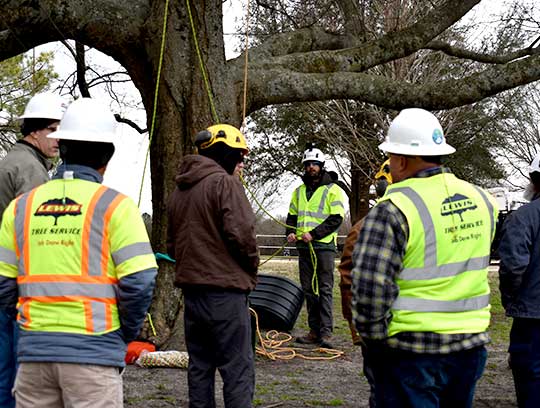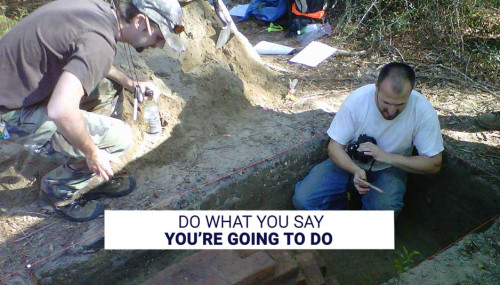Many teambuilding and training sessions open with ice-breaker games that uncover interesting details about coworkers. Most common is the round-robin sharing of one’s name, job title, and a fascinating tidbit of information. Despite the frequency of these exercises, the majority of us still mentally scramble to think of something unique that will surprise and impress the group: a proud accomplishment (“I’ve climbed all 46 peaks in the Adirondacks”); an exciting announcement (“We’re going to be grandparents!”); or a piece of personal trivia (“I played an extra in the movie Happy Gilmore.”).
Bret Kent, Technical Training Manager for Lewis Services, can simply point to his resume to reveal an unexpected, super-cool fact: Kent was once an archeologist.
Though he has worked in vegetation management for more than a decade, Kent’s professional path did not start with climbing trees—but by digging in the dirt. With a Bachelor’s degree in history and love for the outdoors, Kent’s first career was spent on archeological digs in southeastern parts of the United States, including Georgia, Florida, and Louisiana.
From that day forward, I redirected my whole career toward training and safety. It propelled me to where I am now.
The switch from archeology to vegetation management may seem like an unlikely plot twist, however many of the skills that Kent honed on historic dig sites have proven to be critical assets on Lewis job sites. Comparing the two, Kent cites the importance of safety protocols, the correct usage of tools and equipment, and strict attention to detail as shared priorities between the sectors. He also regards honesty, responsibility, and reliability as intangible qualities that are vital across both disciplines. “Whether you’ve been tasked with maintaining the integrity of a dig site or testing the integrity of a harness, a great deal rests on your commitment to accountability and doing what you said you were going to do.”

A Life-Altering Lesson
Kent’s on-ramp to vegetation management was somewhat surprising and swift. With a growing family and the responsibilities that accompany parenthood, Kent knew that spending months on remote dig sites was no longer sustainable. Faced with a new project that would have required six or more months away from home, Kent and his wife (also an archeologist) made the decision to move their family from Florida to Ohio, where he quickly began a career in the tree industry.
Kent’s first job was with a small residential-commercial (RESCOM) company as a climber trainee. After holding leadership positions on archeological sites, starting a new job at ground level (literally and figuratively) could have been discouraging. However, Kent quickly fell in love with the industry and took full advantage of every learning opportunity.
A pivotal point came just weeks into his new career. “The hazards of this industry impacted me pretty quickly when I saw a close call within my first month of doing tree work. A coworker could have died if they had been standing twelve inches to the left. Yet everyone just laughed it off and kept working.”
Looking back, Kent knows that his former team understood the severity of the situation, but they had grown desensitized due to their constant exposure to risk. Nevertheless, Kent took the incident very seriously. “From that day forward, I redirected my whole career toward training and safety. It propelled me to where I am now.”

Called to Safety
This principle directly impacts our daily interactions with our coworkers. It drives our commitment to our customers and the communities we serve. When we DON’T follow up on what we’ve pledged to do, the consequences can be significant.
That close call inspired Kent to learn all he could about safety. Leveraging his research roots, he studied safety at a very deep level. He was committed to expanding his own knowledge so that he could teach others. While working his way up the ladder from trainee to trimmer and then crew leader, he was organically pulled into a company leadership role where he was responsible for safety and training. Kent became a de facto trainer and simultaneously created a comprehensive safety policy for the company, developed a standardized training program for new hires, and instituted weekly safety briefs. Kent had found his calling.
After four years with the RESCOM company, Kent joined Lewis Services as a Safety Specialist. In this role, he has grown as a safety expert and respected leader. Kent’s approach to safety draws from his previous career in archeology, time in RESCOM, and an innate sense of curiosity. The culmination of these experiences and methodologies has resulted in an inquisitive, data-probing approach that has served him well.
As a social scientist, Kent studied human activity through the discovery and analysis of artifacts. This scientific process requires patience, keen observation skills, and acute attention to detail. Upon entering the vegetation management sector, Kent quickly discovered that these qualities were relevant and transferrable—especially when applied to Human Performance and safety. Situational awareness, following proper protocol, and personal responsibility are paramount to sending everyone home safely each day.

Putting Leadership Into Action

Bret Kent conducting safety training with Lewis employees
At face value, the leadership principle “Do what you say you’re going to do” seems straightforward and simple. Kent emphatically disagrees. “This Leadership in Action principle isn’t a casual statement. It is the foundation upon which everything else is built.” He continues, “This principle directly impacts our daily interactions with our coworkers. It drives our commitment to our customers and the communities we serve. When we DON’T follow up on what we’ve pledged to do, the consequences can be significant.”
So how does this principle come to life each day? As a safety expert and trainer, Kent ranks reliability as a critical component. Similar to earning trust, reliability must be consistently demonstrated before it’s believed. Team members depend on clear, consistent communications from leadership and coworkers, and must be able to trust that the information they’re given is complete, correct, and timely. A breakdown in communication can have dire results in vegetation management.
Kent knows that, as humans, we’re going to fail sometimes. We’re going to miss a deadline, make a faulty assumption, or take a shortcut. Some of these missteps will be completely unintentional while others may be due to lack of time, competing pressures, flawed prioritization, and even excessive confidence. Kent believes that, in vegetation management, there is a dangerous space where crew members are confident enough in their skills to not need supervision all the time—but don’t yet have the experience to appreciate why certain procedures are in place. He explains, “Workers may think, ‘I can skip that step because I’m experienced now.’ In reality, that overly-confident perspective is a step onto a slippery slope that can lead to devastating consequences.”

The Culture of Accountability at Lewis
While mistakes will inevitably occur at some point, a true measure of character is how those missteps are acknowledged and fixed. Kent reflects, “Part of being reliable is not shying away from our mistakes—but owning them. It’s how you carry yourself forward from that point that really matters.”
Kent firmly believes that Lewis leads the industry in creating a culture of accountability. He views Lewis’ Operating Principles as the foundation upon which standards and expectations are built, as well as the foundation of the company’s culture. “I have repeatedly heard from Lewis employees—especially frontline workers who started at other companies—'We live out those principles every day—and they’re lived by everyone.’ Hearing frontline team members say this across the company is so powerful and important.”
Kent appreciates the role he plays in Lewis operations and safety, and he does not take his responsibilities lightly. With professional and personal conviction, Kent seeks to move the needle on safety and accountability not just because it’s his job—but because it’s his passion – and because that’s what HE said HE is going to do. “I try to approach each day with this question: ‘How can I make a positive impact today on safety, on business, and on the people I’m working with shoulder-to-shoulder?’ I know it’s an ongoing process that must be continuously cultivated, verbally reiterated, and physically demonstrated to be effective. At Lewis, I’m proud to be in good company on this journey.”
Part of being reliable is not shying away from our mistakes—but owning them. It’s how you carry yourself forward from that point that really matters.








